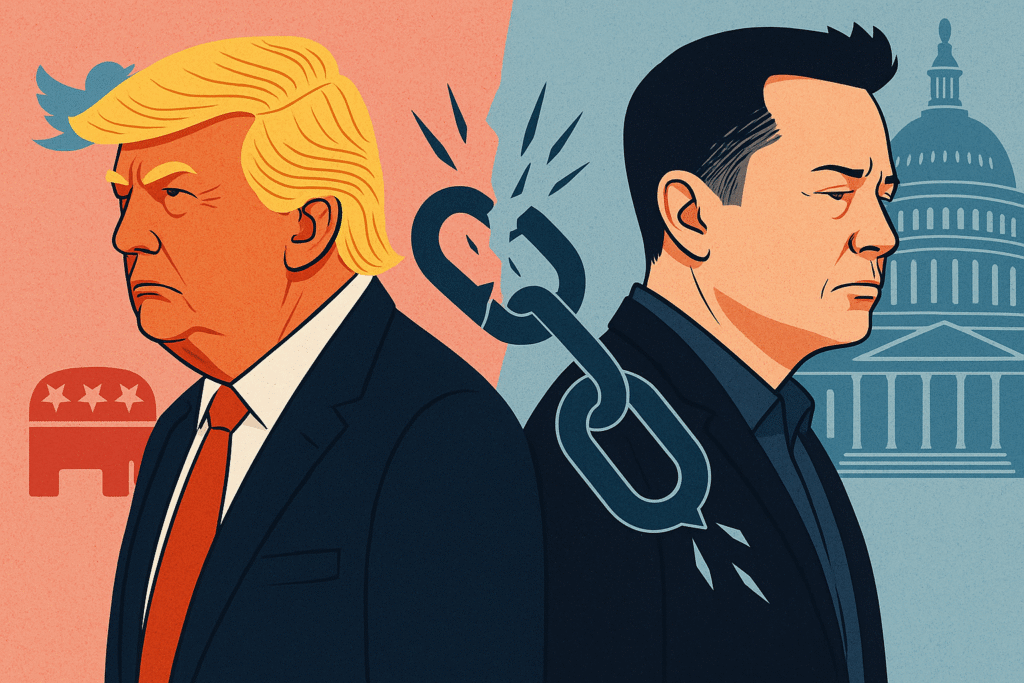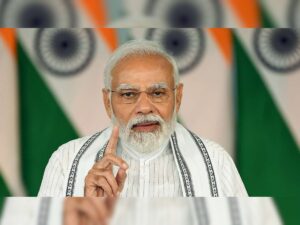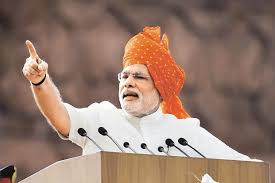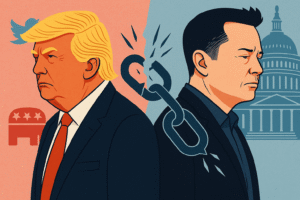Elon Musk and Donald Trump’s Public Breakup: From Political Allies to Fierce Rivals

The relationship between Tesla CEO Elon Musk and former President Donald Trump has long fascinated both political observers and the business world. Once united by mutual interests and public camaraderie, the two high-profile figures are now embroiled in a very public and personal feud. At the heart of this rift are disagreements over Trump’s sweeping tax and spending bill—dubbed the “Big Beautiful Bill”—and the unraveling of a partnership that once shaped the Republican political landscape. The fallout has not only captured headlines but also sent ripples through the tech and political communities, raising questions about influence, loyalty, and the future of both men’s ambitions.
This article explores the rise and fall of the Trump-Musk alliance, the events that led to their dramatic breakup, and what this means for American politics, business, and the broader public.
The Rise of a Powerful Alliance
How It Began
Elon Musk and Donald Trump’s relationship began as a pragmatic alliance. Trump, seeking to harness the energy of the tech sector and the innovation economy, welcomed Musk into his inner circle. Musk, for his part, saw an opportunity to influence policy in ways that could benefit his companies—Tesla, SpaceX, and later, his social media platform X (formerly Twitter).
Musk’s support for Trump became especially visible during the 2024 presidential campaign. He contributed hundreds of millions of dollars to Republican campaigns and was frequently seen alongside Trump at rallies and events. After Trump’s victory, Musk was appointed to lead the Department of Government Efficiency, a new initiative aimed at slashing federal spending and streamlining government operations.
Mutual Benefits
The partnership appeared mutually beneficial. Trump gained a high-profile business ally who could appeal to both Silicon Valley and Main Street. Musk, meanwhile, enjoyed unprecedented access to the White House and was able to advocate for policies favorable to electric vehicles, space exploration, and deregulation.
The Breaking Point: Trump’s “Big Beautiful Bill”
The Bill That Sparked the Feud
The seeds of discord were sown with the introduction of Trump’s signature domestic policy bill—the “Big Beautiful Bill.” This sweeping legislation included massive tax cuts for manufacturing and energy companies, deregulation, and, crucially, the elimination of key tax credits for electric vehicles (EVs). For Musk, whose Tesla empire relies heavily on such incentives, the bill was a direct threat.
Musk did not hold back. He took to X to denounce the bill as a “disgusting abomination,” warning that it would balloon the federal deficit and undermine the growth of clean energy in America. He also criticized the “mountain of disgusting pork” in the bill, referring to the various spending provisions that benefited special interests.
Trump’s Response
Trump, caught off guard by Musk’s public criticism, responded during an Oval Office meeting with German Chancellor Friedrich Merz. “Elon and I had a great relationship. I don’t know if we will anymore,” Trump told reporters. “I’m very disappointed in Elon. I’ve helped Elon a lot”.
Trump claimed that Musk’s opposition was motivated by the removal of EV tax credits and accused him of being upset that his pick to run NASA was rejected by the administration. He also suggested that Musk had benefited greatly from American policy and was now biting the hand that fed him.
Musk’s Explosive Claims: “Without Me, Trump Would Have Lost”
The Tweet Heard Around the World
The feud escalated dramatically when Musk tweeted, “Without me, Trump would have lost the election, Democrats would control the House, and Republicans would only have a 51-49 lead in the Senate”. Musk’s claim was not just a boast about his influence; it was a direct challenge to Trump’s political legitimacy and a public airing of grievances.
Musk’s post also included the phrase “Such ingratitude,” making it clear that he felt unappreciated for his financial and strategic support during the 2024 campaign. According to Federal Election Commission records, Musk had invested nearly $300 million in the 2024 election cycle, making him one of the largest donors to Republican causes.
Trump Fires Back
Trump was quick to respond, insisting that he would have won Pennsylvania and the presidency without Musk’s help. He maintained that Musk’s criticism was rooted in personal disappointment over the EV tax credit cuts and denied that Musk had played a decisive role in the election outcome.
The Fallout: From Best Friends to Public Enemies
Personal Barbs and Public Attacks
What followed was a series of increasingly personal attacks. Musk resurfaced old Trump tweets about balanced budgets and debt ceilings, mocking the president’s reversal on fiscal responsibility. Trump, in turn, made jokes about Musk’s appearance and questioned his loyalty.
The feud quickly became the talk of Washington and Silicon Valley. Media outlets described it as the “messiest breakup of the year,” and analysts speculated about the impact on both men’s reputations and fortunes.
Impact on Tesla and the Markets
The public spat had immediate financial consequences. Tesla stock dropped more than 8% in a single day, wiping out nearly $11 billion from Musk’s personal net worth. Investors worried that the loss of political goodwill in Washington could hurt Tesla’s prospects, especially with the looming rollback of EV incentives.
What’s Really at Stake? Power, Policy, and the Future
The EV Mandate and Policy Disputes
At the heart of the dispute is the EV mandate in Trump’s bill, which accelerates the expiration of the clean vehicle tax credit and introduces new fees for electric and hybrid vehicle owners. For Musk, this is not just a business issue but a matter of principle—he has long championed the transition to sustainable energy and sees the bill as a step backward.
Trump, on the other hand, is focused on appealing to traditional manufacturing and energy sectors, which remain skeptical of rapid electrification. The bill’s supporters argue that it will boost American industry and reduce government spending, while critics warn that it will stifle innovation and harm the environment.
The Role of Mega-Donors in Politics
Musk’s claim that he “delivered” the election for Trump highlights the growing influence of mega-donors in American politics. His financial contributions funded get-out-the-vote efforts, advertising campaigns, and grassroots organizing that were crucial to the Republican victory. The episode raises important questions about the balance of power between elected officials and wealthy backers.
The End of an Era
The breakup marks the end of an era in Republican politics. For years, Musk and Trump represented a powerful alliance between business and government, innovation and populism. Their falling out exposes the fragility of such partnerships and the risks of relying too heavily on personal relationships in the pursuit of power.
Reactions from the Public and Political World
Supporters and Critics Weigh In
The feud has divided both Trump’s and Musk’s supporters. Some conservatives have rallied behind Trump, accusing Musk of disloyalty and self-interest. Others have praised Musk for standing up to what they see as reckless government spending and for defending the interests of the tech sector.
Progressives, meanwhile, have watched the drama with a mix of amusement and concern, noting that the dispute reveals the outsized role that billionaires play in shaping public policy.
Media Coverage and Social Media Buzz
The story has dominated headlines, with live updates and analysis from major outlets like The New York Times, BBC, CNN, and Reuters. On X, the hashtag #TrumpElonBreakup trended for hours, as users debated the merits of each side’s arguments and speculated about the future of both men.
What’s Next for Trump and Musk?
Trump’s Political Future
For Trump, the loss of Musk’s support is a setback but not necessarily a fatal blow. He remains a dominant force in the Republican Party and continues to command a loyal base. However, the episode may make it harder for him to unite the party’s business and populist wings, especially as he pursues further economic reforms.
Musk’s Next Moves
Musk’s future is less certain. While he remains one of the world’s richest and most influential figures, the loss of political access in Washington could complicate his efforts to expand Tesla, SpaceX, and his other ventures. He has signaled that he will continue to speak out on policy issues and may even become more involved in politics as a donor and activist.
Conclusion: Lessons from a High-Profile Breakup
The public breakup between Elon Musk and Donald Trump is more than just a clash of egos—it is a window into the complex interplay of business, politics, and personal ambition in 21st-century America. Their alliance, once a symbol of innovation and disruption, has ended in acrimony and mutual recrimination.
As both men chart their next moves, the episode serves as a reminder that in politics and business, alliances are often temporary, and today’s friends can quickly become tomorrow’s rivals. For the American public, the feud is a spectacle—but it also raises serious questions about who holds power, how decisions are made, and what the future holds for the nation’s leadership.




